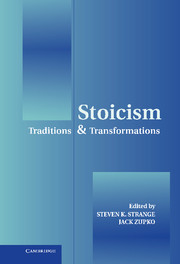Book contents
- Frontmatter
- Contents
- List of Contributors
- Acknowledgments
- List of Abbreviations
- Stoicism
- Introduction
- 1 The Socratic Imprint on Epictetus' Philosophy
- 2 The Stoics on the Voluntariness of the Passions
- 3 Stoicism in the Apostle Paul: A Philosophical Reading
- 4 Moral Judgment in Seneca
- 5 Stoic First Movements in Christianity
- 6 Where Were the Stoics in the Late Middle Ages?
- 7 Abelard's Stoicism and Its Consequences
- 8 Constancy and Coherence
- 9 On the Happy Life: Descartes vis-à-vis Seneca
- 10 Psychotherapy and Moral Perfection: Spinoza and the Stoics on the Prospect of Happiness
- 11 Duties of Justice, Duties of Material Aid: Cicero's Problematic Legacy
- 12 Stoic Emotion
- Works Cited
- Name Index
- Subject Index
11 - Duties of Justice, Duties of Material Aid: Cicero's Problematic Legacy
Published online by Cambridge University Press: 11 July 2009
- Frontmatter
- Contents
- List of Contributors
- Acknowledgments
- List of Abbreviations
- Stoicism
- Introduction
- 1 The Socratic Imprint on Epictetus' Philosophy
- 2 The Stoics on the Voluntariness of the Passions
- 3 Stoicism in the Apostle Paul: A Philosophical Reading
- 4 Moral Judgment in Seneca
- 5 Stoic First Movements in Christianity
- 6 Where Were the Stoics in the Late Middle Ages?
- 7 Abelard's Stoicism and Its Consequences
- 8 Constancy and Coherence
- 9 On the Happy Life: Descartes vis-à-vis Seneca
- 10 Psychotherapy and Moral Perfection: Spinoza and the Stoics on the Prospect of Happiness
- 11 Duties of Justice, Duties of Material Aid: Cicero's Problematic Legacy
- 12 Stoic Emotion
- Works Cited
- Name Index
- Subject Index
Summary
THE STATESMEN'S BIBLE
A child born this year in the United States has a life expectancy of 76.4 years. A child born in Sierra Leone can expect to live 34.7 years. Most adults in the United States and Europe are literate, although illiteracy remains a disturbing problem, correlated with poverty. Some developing countries attain nearly our overall rate of literacy: Sri Lanka, for example, has 90 percent adult literacy, the Philippines 94.6 percent, Jordan 86.6 percent. In many nations, however, a person's chance of learning to read (and, hence, to qualify for most well-paying jobs) is far lower. In India, only 37 percent of women and 65 percent of men are literate, in Bangladesh 26 percent of women and 49 percent of men, in Niger 6 percent of women and 20 percent of men. Clean water, health services, sanitation, maternal health and safety, adequate nutrition – all these basic human goods are distributed very unevenly around the world. The accident of being born in one country rather than another pervasively shapes the life chances of every child who is born. Being female, being lower-class, living in a rural area, and membership in an ethnic or racial or religious minority also affect life chances within every nation. But, on the whole, differences of wealth and opportunity among nations eclipse these differences.
- Type
- Chapter
- Information
- StoicismTraditions and Transformations, pp. 214 - 249Publisher: Cambridge University PressPrint publication year: 2004
- 1
- Cited by



